(This event report of RailsGirls Pune – a one-day conference for women working on Ruby-on-Rails, first appeared on the Josh Software Blog, and is reproduced here with permission for the benefit of PuneTech readers.)
I was skeptical! Just from my experience of organizing RubyConf India and some local meetups, I was sure the turnout would be low and the event would be ‘casually boring’. If only I knew how crazily wrong I was!
A few days before the event, seeing about 250 registrations was itself a revelation. Then the turnout of over a 100 girls was exhilarating to say the least. I mean, how often does one get a chance to address a crowd at a techie event with ‘Hello Ladies!’. I am indeed lucky.
 Josh Software was one of the sponsors along with ThoughtWorks and CodeIgnition. It was great to see a LOT of mentors turn up for the event — which in my opinion was one of the success factors of Rails Girls Pune – EVERYONE got attention and there was never a case where someone was sitting idle or looking around for help.
Josh Software was one of the sponsors along with ThoughtWorks and CodeIgnition. It was great to see a LOT of mentors turn up for the event — which in my opinion was one of the success factors of Rails Girls Pune – EVERYONE got attention and there was never a case where someone was sitting idle or looking around for help.
The demographics of the crowd was varied – quite a few girls had come down to Pune for this event, some even travelling most of the night to get here!. There were a lot of girls with a prior technical background but none in Ruby. And there were 5 people who were entirely new to programming and they too managed to code, gleefully if I may add! It’s not often you get to hear an artist talk about controllers and methods. 🙂

One good cultural change that stood out was the kids running around an event with their dad’s baby-sitting them while the mom’s coded!
Proceedings were kick-started off by Gunjan from ThoughtWorks. She spoke about Women in Technology and Leadership and why such events are so important for everyone.
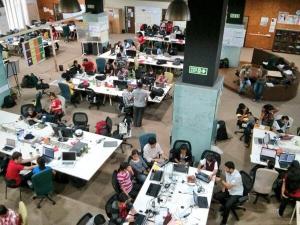
After a brief introduction from other sponsors, all participants were divided among various tables and each table was assigned a mentor, though I saw at least 2 or 3 mentors at each table. Everyone was eager to help and answer questions.
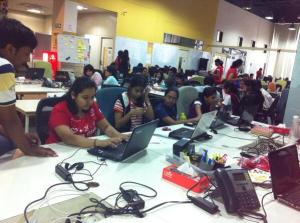 As the mentors were aware of the RailsGirls teaching process, it started of with getting familiar tryruby.org before moving on to other things like BentoBox and explaining basic concepts of Rails. Before long, everyone was busy working hard!
As the mentors were aware of the RailsGirls teaching process, it started of with getting familiar tryruby.org before moving on to other things like BentoBox and explaining basic concepts of Rails. Before long, everyone was busy working hard!
There were lot’s of discussions happening amidst kids running around, regular trips for getting more coffee or tea or some snacks. Before long, it was time for lunch and a breather.
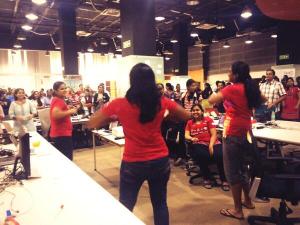 ThoughtWorks organized an awesome lunch and after lunch, it required more than just Ruby to shake everyone up. What better than a ChikenDance for 5 minutes that started slow with a little bit of shyness among the audience but reached a crescendo with everyone joining in!
ThoughtWorks organized an awesome lunch and after lunch, it required more than just Ruby to shake everyone up. What better than a ChikenDance for 5 minutes that started slow with a little bit of shyness among the audience but reached a crescendo with everyone joining in!
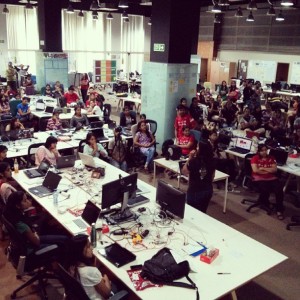 There were three Lightening Talks to get the crowd back into the coding groove. I spoke about why we love Ruby with the talk ”My Grandmother can read my code“. Praveena gave a talk on “Perks of being a Programmer” and Nishita gave a talk about “How the Internet works!”.
There were three Lightening Talks to get the crowd back into the coding groove. I spoke about why we love Ruby with the talk ”My Grandmother can read my code“. Praveena gave a talk on “Perks of being a Programmer” and Nishita gave a talk about “How the Internet works!”.
The afternoon was one busy session and everywhere you went, you heard only about Controllers, Scaffold, Bootstrap etc. – music to my ears!
Towards the end of the session, we had some participants showcase their work after uploading on Heroku. A few mentions of some really good work are http://vast-mesa-2265.herokuapp.com/ideas and http://shrouded-cove-2185.herokuapp.com/
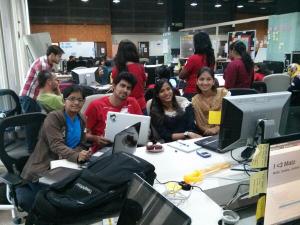 The mentors did a wonderful job and got a lot of appreciation from all. Well, at the end of the day, a lot of people mad new friends. (Do not miss the “I <3 Matz” on the bottom right corner of the photo!)
The mentors did a wonderful job and got a lot of appreciation from all. Well, at the end of the day, a lot of people mad new friends. (Do not miss the “I <3 Matz” on the bottom right corner of the photo!)
Anup and Prathamesh wound up proceedings with introducing everyone to Pune Ruby User Group and after the prolonged networking that ensued, everyone called it a day and probably slept the night dreaming of instance variables!
A special thanks to Shilpa Nair and Hephzibah who did a wonderful job organizing RailsGirls. Hope to see more of these events soon. Do like the Rails Girls Facebook Page and show your appreciation!


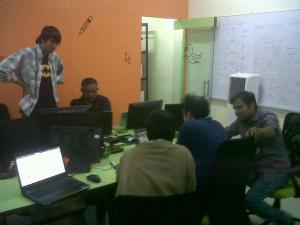

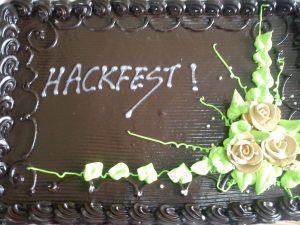


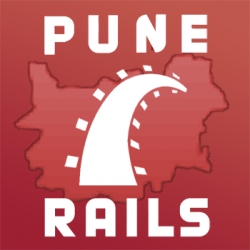
![Reblog this post [with Zemanta]](http://img.zemanta.com/reblog_b.png?x-id=7dd80619-799b-4d7c-9070-8c081835dcc7)
![Reblog this post [with Zemanta]](http://img.zemanta.com/reblog_e.png?x-id=952032d0-eefa-4df0-8729-51f1ebb48adc)